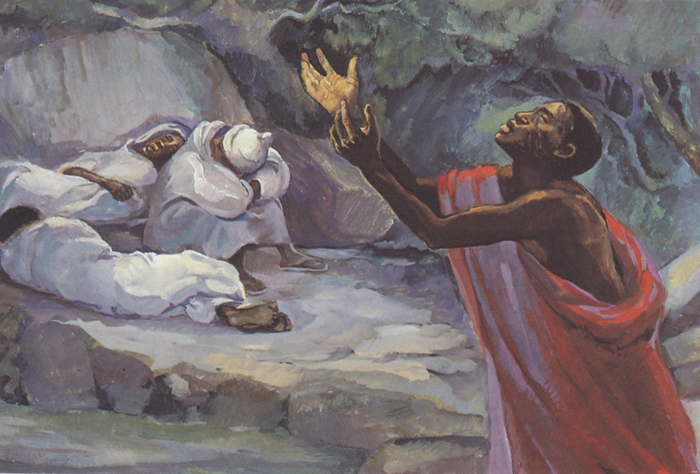
Image credit: Christ on Gethsemane, from Art in the Christian Tradition,
a project of the Vanderbilt Divinity Library, Nashville, TN.
If, like John, you wondered why I haven’t blogged for the last eleven days, it’s because I was on holiday. I continued singing the daily hymn from Sing Praise, but just haven’t been at a computer to write about them. I may find time to go back to them later.
Today’s choice is “We do not hope to ease our minds” by Marnie Barrell. It’s in the general ‘God and the World’ section of the book, but as two of the verses refer to Holy Week, it would actually have been better sung then. The theme of the three verses is that the needs of the world are so insistent and demanding of a compassionate response, that we (members of the Church) cannot comfort ourselves with an easy-living faith.
The ‘simple answers, shifted blame’ of verse 1 will not cut it with Christ who, as he put in the parable of sheep and goats, is present in everyone in physical or emotional need. We ask in this verse to be ‘disturb[ed] till every need is satisfied’, which of course is never in this life.
Verse 2 refers to Christ’s unjust trial and torture at the hands of the Romans, standing as a symbol for all the injustice and violence in the world, the pain of which he bore on the cross. As with verse 1, we ask to be ‘given no peace till his peace reigns in triumph here’, and again that will not happen until Jesus returns. We are asking here for a permanent sense of being troubled by the way the world is, and what we might be able to do about it.
The last verse begins ‘We will not pray to be preserved from any depths of agony’, although in fact that’s just what Jesus did in Gethsemane, before accepting his Father’s will. I therefore don’t think there’s anything wrong with praying to be spared agony. A true faith lived out will include moments of discomfort and inconvenience at the very least, but there’s a very wide spectrum between ‘comfortable Christianity’ and martyrdom. As Paul wrote to the Corinthians, God knows each of us individually and will not let us be tested beyond what we can endure.
The hymn is set to a metrical version of ‘St Patrick’s breastplate’, maybe with deliberate reference to the ascetic saint’s own renouncing of comfortable worldliness in the service of Christ.